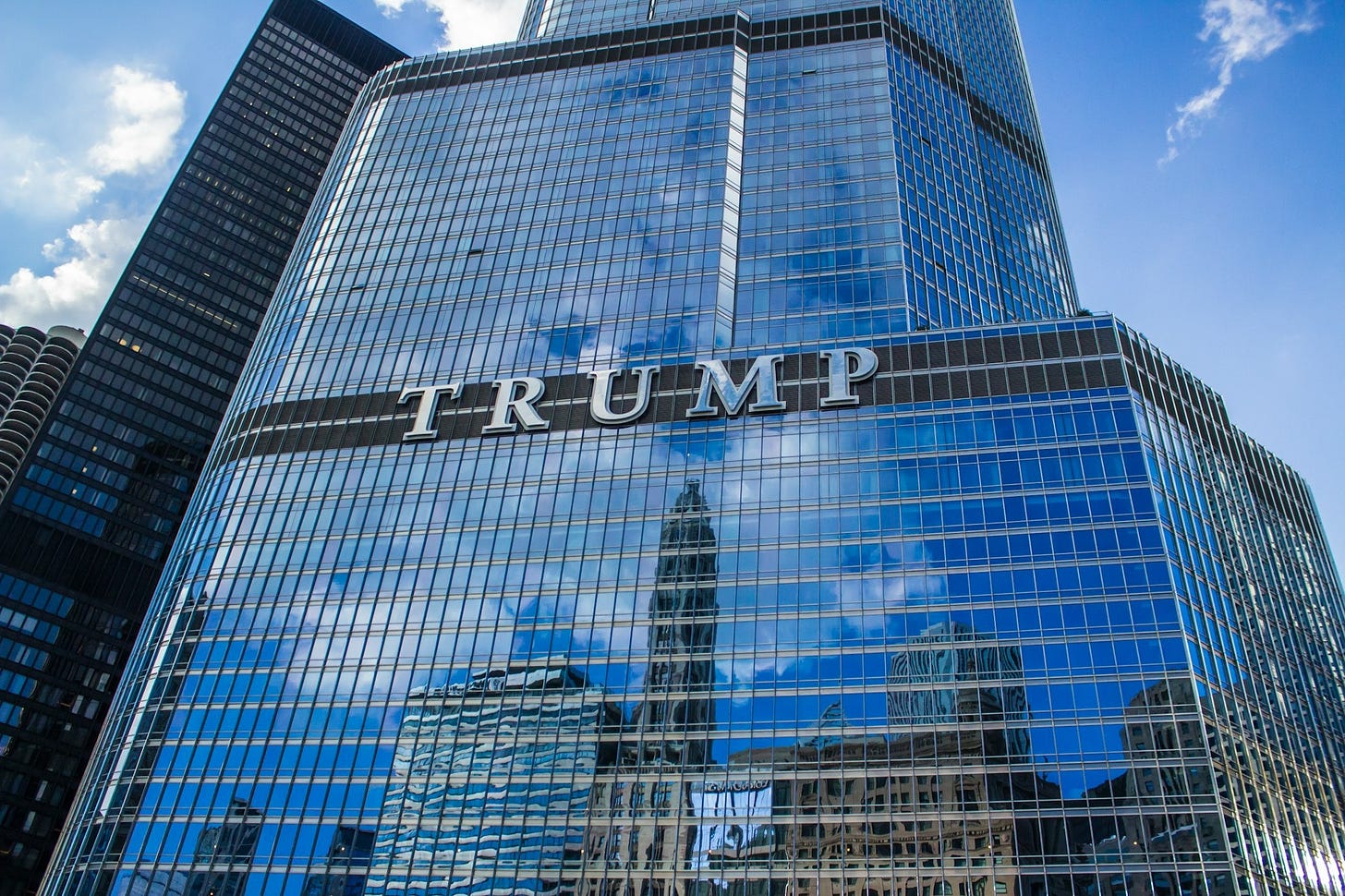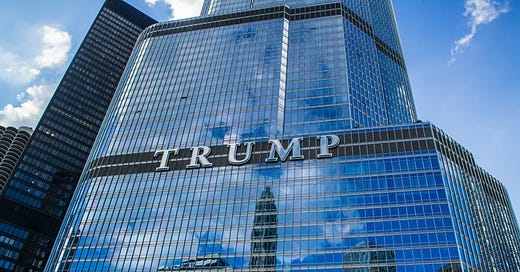Trump's hush money conviction
Should Donald Trump have been convicted in the hush money case? Viewpoints from multiple sides.

New to Framechange? Sign up for free to see multiple sides in your inbox.
Learn more about our mission to reduce polarization and how we represent different viewpoints here.
What’s happening
Yesterday, former President Donald Trump was convicted on all 34 felony counts in his “hush money” trial. He becomes the first former president and first major party presidential nominee to be convicted of a felony.
Case context: The case, brought by Manhattan District Attorney Alvin Bragg, focused on Trump’s alleged falsifying of business records to cover up a payment made in 2016 to adult film star Stormy Daniels. Trump made a payment of $130,000 through his former lawyer Michael Cohen to keep Daniels quiet about an alleged sexual encounter with Trump roughly 10 years prior.
Hush payments by themselves are not illegal. According to prosecutors, however, Trump’s payment qualified as an illegal campaign contribution to himself – above the $2,700 legal limit – because buying Daniels’ silence sought to influence the 2016 presidential election. Cohen was repaid in increments falsely categorized as “legal expenses.”
Legal details: The prosecution focused on the combination of Trump’s falsifying business records (misdemeanors by themselves) and using those records to cover up another crime, which elevated the falsified records charges to felonies. For a guilty verdict, jurors had to conclude that a) Trump falsified the records with fraudulent intent and b) the records were falsified to conceal another crime. (In addition to claiming Trump made illegal campaign contributions, prosecutors argued the cover up violated New York law provision Section 17-152, which prohibits conspiring to promote or prevent a candidate’s election.)
The jury finding Trump guilty on all 34 felony counts (one for each of the falsified documents) indicates they were convinced beyond a reasonable doubt both criteria were satisfied. While Trump could face up to 4 years in prison, the likelihood of a prison sentence is unclear. Trump is also likely to appeal the conviction, which could take months or even years.
Election implications: The conviction does not preclude Trump from continuing as the Republican nominee or becoming president. Its potential impact on Trump’s election odds is not fully clear, with different polls suggesting it could help, hurt, or marginally affect his candidacy.
Debate swirled prior to the conviction over how the jury should rule. This week, we bring you viewpoints from across the spectrum on whether Trump should have been convicted or acquitted. Many of the viewpoints were published prior to yesterday’s decision but represent notable arguments around the case. As always, let us know what you think.
Notable viewpoints
More opposed to the conviction:
Michael Cohen’s testimony was untrustworthy.
Michael Cohen – who served a 3-year prison sentence for charges related to federal campaign finance crimes – is a convicted criminal who has admitted to lying to Congress in a previous court case and can’t be trusted.
Under oath, Cohen admitted to stealing $60,000 from the Trump Organization, which clouds his credibility and motivations toward the Trump Organization.
Cohen was found to be misleading on the stand when claiming he told Trump about the completion of a payment to Stormy Daniels in October 2016, a call that phone records revealed was to Trump’s bodyguard about prank calls from a 14-year-old with no evidence it included discussion of hush payments.
There were significant holes in the prosecution’s case.
While falsified business records elevate to a felony if they are used with an intent to cover up an underlying crime, Trump has not been charged for a specific underlying crime nor is there sufficient evidence he intended to commit one.
If the payments to Daniels were not understood by Trump to be illegal campaign contributions, as Trump’s lawyers maintained, elevating the falsely-labeled checks to a felony would likely require Trump was aware of a unique New York statute called Section 17-152 that had never been enforced before, and unlikely to be in Trump’s awareness.
Justice Juan Merchan should have dismissed the case because the prosecution failed to present evidence for all its elements; namely, there is no evidence that it was false or fraudulent to call the payments to Cohen “legal expenses,” which could reasonably be labeled as such for services Cohen would provide in the future.
Other legislative authorities declined to take up the case against Trump based on its weaknesses.
The case would have been unlikely to succeed in any other venue; the US Department of Justice, after experiencing a failure to convict 2008 Democratic presidential candidate John Edwards for hush money as a campaign contribution in a previous case, declined to press charges against Trump for the payments in question in this case.
The case depends on such a tangle of interacting laws and provisions that Trump has good reason to appeal, and helps explain why previous New York District Attorney Cyrus Vance Jr. declined to prosecute Trump.
The case was primarily a political maneuver by Democrats aimed at damaging Trump’s presidential candidacy.
The hush money trial was a partisan tactic by the Democratic party to take down Trump in an election year.
“The problem, of course, goes beyond public perceptions. If Bragg is prosecuting Trump in a desperate, last-ditch attempt to prevent him from reoccupying the White House—and that is certainly how it looks—he is abusing his powers and perverting the law. The case seems to exemplify the very sort of misconduct that Trump's opponents fear he will commit if he wins the election.” (Jacob Sullum, senior editor at Reason.)
More supportive of the conviction:
Michel Cohen’s testimony was credible and incriminating of Trump.
Cohen’s openness about his motivations and past convictions lend credibility to his testimony, and the fact he’s already served time for crimes related to hush money payments should have made his account convincing to jurors.
Cohen appeared convincing and calm on the stand despite the defense’s brutal cross-examination of him; the prosecution had already introduced evidence from witnesses including Stormy Daniels, David Pecker, Hope Hicks, and Keith Davidson that corroborated his account.
The prosecution’s case that Trump falsified documents with intent to defraud was supported by evidence.
The answer to the question of whether the business records were indeed falsified is “absolutely;” several witnesses supported the claim that Trump’s payments were not legal fees and Trump himself tweeted in 2018 that Cohen received a “reimbursement.”
Witnesses testified that several of the checks paid to Cohen were personally signed by Trump and his closest confidants including his son Eric Trump and former Trump Organization CFO Allen Weisselberg, suggesting Trump’s personal involvement in the payments made to Cohen.
Witness testimony that Trump meticulously controls expenses and was aware of the falsely prepared invoices is convincing given the total $420,000 reimbursed to Cohen is a significant sum.
The prosecution’s case that the falsified documents were used to cover up another crime was strong.
While Trump may have partly intended to protect his family with the hush payments to Daniels, evidence in the case suggests he also intended to promote his campaign chances illegally; for example, Cohen’s account of interactions with Trump indicated Trump’s awareness of the alleged affair’s importance to his campaign.
While the defense wanted the jury to be instructed to agree on which “unlawful means” were used to promote Trump’s election, New York law does not require such an agreement; it only requires agreement that some law was broken to promote his election, which played favorably for the prosecution.
Defense witness Robert Costello damaged the defense’s standing with the jury.
Defense witness Robert Costello, former federal prosecutor and former Trump confidant, seemed to damage the defense’s standing with the jury through his contemptuous conduct on the stand and poor performance in cross-examination by the prosecution.
The trial highlights the Republican party’s tolerance for poor character.
The details of Stormy Daniels’ testimony, paired with Trump previously being found legally liable for sexually abusing Jean E. Carroll, underscores Trump’s moral repugnance, and the continued defense by his Republican party is reprehensible.
The visible defense of Trump by Republican politicians during the trial, highlighted by their showing up to the courthouse in solidarity, signifies how far the Republican party has fallen into its permissiveness of ethical violations among its members.
Other viewpoints:
The conviction may threaten the nation’s confidence in the rule of law if it leads to a successful appeal.
“Imagine a scenario in which Trump is convicted at the trial, Biden condemns him as a felon and the Biden campaign runs ads mocking him as a convict. If Biden wins a narrow victory but then an appeals court tosses out the conviction, this case could well undermine faith in our democracy and the rule of law.” (David French, New York Times opinion columnist.)
The case likely helps Trump’s candidacy despite the conviction.
Despite the case’s outcome, Trump has benefited from the appearance of persecution throughout his trial and it is likely to help his political standing by rallying conservatives.
Support Framechange by sharing it
Help us reduce polarization by spreading the word on Framechange. We believe our world would be a better place if everyone had a straightforward understanding of multiple sides. Click the button below to share with friends, family members, or colleagues. We'd greatly appreciate it!
From the source
Read more from select primary sources:
Full text: Donald J. Trump Indictment
Full text: Donald J. Trump Statement of Facts
Full text: Jury verdict sheet
Be heard
We want to hear from you! Reply to this email with your perspective on Trump's conviction and we may feature it in our socials or future newsletters. Below are topic ideas to consider.
Do you agree or disagree with the jury’s decision to convict Trump on all 34 felony counts?
What are some arguments or supporting points you appreciate about a viewpoint you disagree with?
Give us your feedback! Please let us know how we can improve.
#BTW
A classic Eagles harmony taking you into the weekend.




